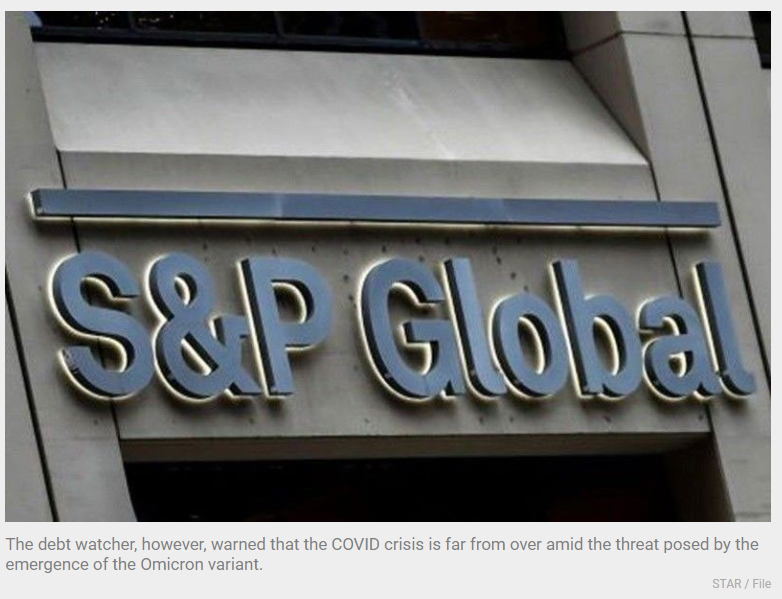Philippines capable of over 7% growth, but Omicron a threat
MANILA, Philippines — The Philippine economy can grow above seven percent over the next three years as it rebounds strongly from the pandemic-induced recession, S&P Global Ratings said.
The debt watcher, however, warned that the COVID crisis is far from over amid the threat posed by the emergence of the Omicron variant.
“Just as Asia-Pacific was learning to live with the virus, the new Omicron variant is already disrupting economic reopening,” it said.
Nevertheless, S&P said the Philippines’ gross domestic product (GDP) could grow 7.4 percent in 2022, 7.3 percent in 2023 and 7.2 percent in 2024, making the Philippines the second fastest growing economy in Southeast Asia next year after Vietnam’s 7.5 percent.
In its latest research note, S&P said COVID policies in the region have put regional economies on a weaker recovery path than the rest of the world.
“While the region was highly successful in curbing the spread of the virus early in the pandemic, it was slow to vaccinate, and is now only gradually reopening borders and relaxing mobility,” it said.
For Southeast Asia, S&P slashed its GDP growth forecast to three percent from an earlier 3.1 percent projection as lockdowns weighed on economic activity, resulting in a weak third quarter performance.
But for the Philippines, S&P upgraded its GDP growth projection to five percent instead of 4.3 percent for 2021 after a faster-than-expected 7.1 percent expansion in the third quarter of the year.
“(The) growth in the Philippines surprised on the upside with year-over-year expansion of 7.1 percent. This surpassed the consensus expectation for a 4.8 percent increase, on strong consumer activity,” S&P said.
S&P said it also expects inflation to ease to 2.4 percent in 2022 and 2023 after accelerating to 4.5 percent this year and exceeding the two to four percent target of the Bangko Sentral ng Pilipinas (BSP).
The debt watcher expects the BSP to maintain an accommodative policy stance next year by keeping the benchmark interest rate at a record low two percent, before delivering a 75-basis-point hike in 2023 and another 25 basis points in 2024.
For its part, Moody’s Investors Service said the emergence of the Omicron variant of the coronavirus poses new risks to the global economic growth and inflation outlook, as concerns mount about the variant’s health risks and several countries have imposed new travel restrictions in recent days.
“The discovery of Omicron underscores our view that the COVID-19 pandemic remains a health threat, as well as the chief source of uncertainty to the global economy and a driver of financial market volatility,” Moody’s said.
In a commentary, Fitch Solutions Country Risk & Industry Research said the new variant continues to emerge in an increasing number of countries.
“The early evidence suggests that in South Africa it is displacing the previously dominant variant, Delta, implying that it has a growth advantage that will enable rapid spread globally, however, data still remains limited,” Fitch Solutions said.
Source: https://www.philstar.com/business/2021/12/02/2145057/philippines-capable-over-7-growth-omicron-threat


 English
English




